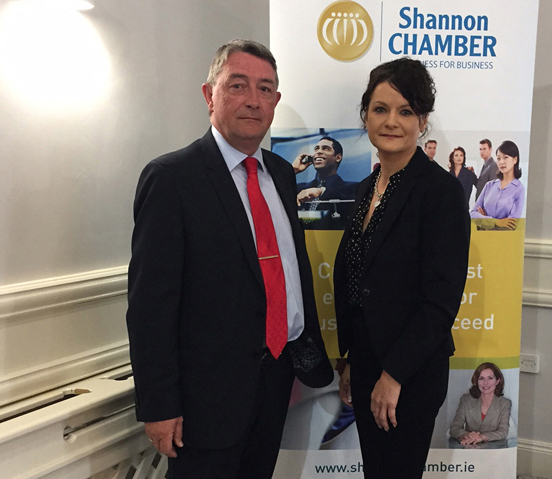
Some Customs Formalities Inevitable post Brexit: SMEs must plan for impact on their Business
John O’Leary, head of e-Customs and director of Brexit planning with Revenue and Helen Downes, CEO, Shannon Chamber.
Describing Brexit as a daunting prospect with more unknowns than knowns at this point, Shannon Chamber’s guest speaker at a recent customs-focused event urged SMEs to start planning for the impact new customs controls could have on their businesses.
John O’Leary, head of e-Customs and director of Brexit planning with Revenue, speaking at the event in Shannon stressed the government ambition to avoid a return to the borders of the past, that the outcome of Brexit will be derived from a political process and that the final result is understandably unknowable at this early stage. However, he acknowledged the prospect that the UK will be out of the EU, the single market and the customs union, and this will signal significant impacts for Irish business, most notably new inward and outward customs declarations, import VAT, additional controls and post clearance checks but also potential issues with origin verification, new duty free rules and ship stores issues, possible VAT refunds for travellers to or rom the UK and even cash controls.
It will be particularly difficult for companies who have not had to deal with customs before and, just as Revenue itself will have to prepare for all scenarios, companies too will have to be in a state of readiness.
“In particular, regular traders need to consider applying for Authorised Economic Operator (AEO) status, as it’s too important to leave it until the last minute to apply, and all traders should be informing themselves about the tariff codes and potential duties applying to their products” he stated.
An AEO is a company that has proved to the Customs Authorities’ satisfaction that it meets stringent criteria related to any of its operational functions that involve customs procedures and processes and is therefore entitled to favourable treatment in their dealings with customs throughout the EU.
“It is uncertain if the procedures currently applicable to goods in transit will cease to apply once the UK leaves the EU and if the arrangements companies are used to will need to be replaced. Our hope is that the UK will stay in the Common Transit system as the alternative TIR system is not nearly as efficient” he said.
Speaking about movements of agricultural products he conceded that, in the absence of a political solution we could be facing a future with veterinary checks on all animals and products of animal origin and limits on personal consignments, which would be a major change from current practice.
“Innovative work practices and use of modern technology will be vital for Revenue in terms of delivering whatever final structures emerge from the negotiations. Traffic management in our major ports will be an obvious challenge,” he said and gave the example of Dublin where port authorities have estimated that physical control of peak traffic would generate 4km tailbacks.
Speaking after the event, Shannon Chamber’s CEO, Helen Downes said; “The main takeaway from this excellent presentation was that certainty may arrive later and the later we know what’s ahead, the less time companies will have to prepare. Companies therefore need to be as prepared as they possibly can and they need to start making decisions for all areas of their business. Revenue and traders alike may have to plan for the worst and work backwards; they simply can’t afford to wait until the last minute.
“On a more positive note, there may be potential for Shannon to capitalise on opportunities for cargo distribution within the EU, particularly for goods travelling from west to east. That is something we as a Chamber are keen to check out further,” added Ms Downes.
